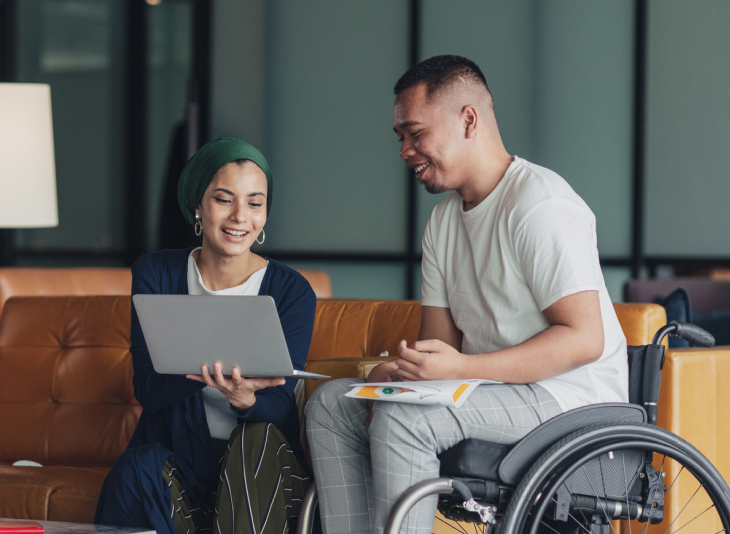Employee Spotlight - Leslie Napper

Employee Spotlight - Leslie Napper
Leslie Napper
Senior Advocate, Mental Health Practice Group

“Whenever ‘I’ is replaced with ‘we,’ even ‘Illness’ becomes ‘Wellness.’”

Finding Her Voice
An eight-year-old Leslie stepped up to the microphone and performed a reading from Langston Hughes. From the confidence in her presentation, you'd never guess that she had an intense shyness. Little did young Leslie know that those experiences using her voice would lead to a life of advocacy and speaking up for others.
Today, Leslie Napper is proud to use her voice as someone who identifies as living with a mental health disability to uplift the voices of communities of color.
Leslie works to share her voice whenever she can because she has experienced barriers to accessing voluntary community-based mental health services. Several years ago, Leslie was left with an untreated mental illness, and due to her mental health disability, she wasn’t able to work and lost her medical benefits, which meant she had to go through the Sacramento County managed health plan (Medi-Cal).
She sought professional medical treatment through a local emergency department and was put on an involuntary psychiatric hold (5150) and then, days later, was sent to a locked facility.
"I did nothing wrong or criminal, and so to be locked away where I couldn’t leave when I wanted to,” Leslie said. “I was living with an untreated severe mental illness and was trying to access professional healthcare because I was not feeling well, and was sent to a locked facility.”
Wellness and Recovery Journey
While in a locked facility, Leslie had an experience that changed her trajectory: meeting with a Peer Advocate. Leslie said that the woman, who identified as Black, came into the facility and saw her for who she was as a person, instead of her illness. “Because of that experience, that is why I am a Peer advocate, literally. That moment was pivotal,” Leslie said.
Through the Peer Advocate, Leslie was connected to an outpatient provider that offered full-service, voluntary, community-based, appropriate mental health services. She was connected to a Full-Service Partnership (FSP) that offered wrap-around services including a case manager, therapist, psychiatrist, support groups, peer support, skill-building capacity groups, permanent housing support, and support with returning to work. “I was fully wrapped in services,” Leslie said. “And because of that, I was able to build the skills I needed to reclaim my life.”
Leslie said that while she does not wish her experience in a locked facility on anyone, she is grateful to model wellness and recovery through advocating for appropriate mental health services.
"I’m grateful for the journey to be able to stand here and say there’s an alternative to unnecessary institutionalization, and an alternative that really works, if we just have access to whole person, voluntary, culturally relevant community-based care, like the care I received,” Leslie said.
Leading with a Purpose
Her experience led Leslie to be a lead plaintiff in a lawsuit, Napper v. County of Sacramento, to preserve Sacramento County’s outpatient mental health clinics. DRC took up the case, which was won in federal court, maintaining the benefits for 5,000 county residents and fostering Leslie’s connection to DRC.
Leslie is currently a Senior Advocate with the Mental Health Practice Group, where she supports the mental health litigation team and ensures that the perspective of people with mental health disabilities is represented.
“Though [I’m] still on the path of my wellness and recovery journey,” Leslie said. “It’s a lifelong journey, and I’m still here advocating for our rights to access mental health care and to be treated with dignity and respect.”
Working with DRC
Leslie said that DRC is unique from other workplaces because of the passion employees have for the work they do, many of whom also live with disabilities. She also complimented the staff for the various creative people who work at DRC.
She has been a leader throughout her career at DRC, serving as a former chair of DRC’s PAIMI Advisory Council and Board of Directors. She is a founding member of two Employee Resource Groups (ERGs): the Allies for All ERG, which gathers employees passionate about creating an educated, supportive, and inclusive culture; and the Umoja ERG, which gathers employees who identify as Black. Leslie is proud to have played a role in creating safe spaces for her colleagues in the workplace.
Her enthusiasm for advocating for people on their mental health journey stems from Leslie’s personal experience, which she proudly shares with others. She said one of her biggest accomplishments is surviving her experiences and now being able to use her voice to empower others, especially people of color, to advocate for their mental health.
Leslie’s message is simple: Access to voluntary community-based mental health treatment services is vital so that everyone has access to care, so they can continue to thrive while on their wellness journey.
“To anyone that's reading or hearing this, know that you are not alone, especially if you know me, you'll never be alone,” Leslie said.
If you are a resident at a state psychiatric hospital, you can call the California Office of Patients’ Rights (COPR) at 1(916) 504-5810.
Work That Makes a Difference
Find out about career opportunities, employee benefits, and more.







